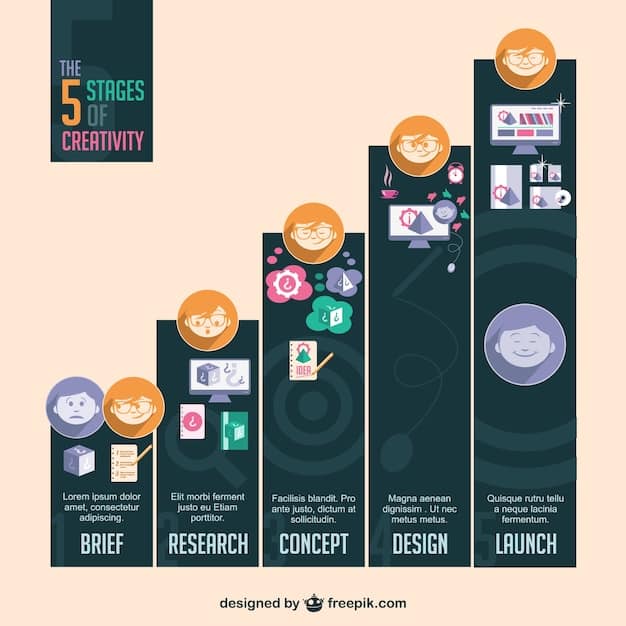Boost Brand Awareness 25% in 3 Months: Podcast Guest Guide 2025

Leveraging podcast interview guests to boost brand awareness by 25% in 3 months: a 2025 guide involves strategic guest selection, compelling storytelling, and consistent promotion, effectively transforming podcast appearances into measurable brand growth within a targeted timeframe.
In today’s competitive digital landscape, capturing audience attention and building brand recognition can feel like an uphill battle. However, a potent, often underestimated strategy for accelerating this growth involves strategic appearances on podcasts. Imagine the impact of reaching engaged, niche audiences who are actively seeking valuable information. This comprehensive guide explores how targeted podcast interview guest spots can realistically elevate your brand awareness by 25% in just three months, providing a detailed roadmap for success in 2025.
The Power of Podcast Interviews for Brand Growth
Podcasting has evolved beyond a niche hobby into a mainstream media powerhouse. Millions tune in daily, forming dedicated communities around specific topics and hosts. For brands, this represents an unparalleled opportunity for direct, authentic communication with a highly engaged audience. Appearing as a guest on a relevant podcast positions you as an expert, builds trust, and expands your reach far beyond your existing network.
The intimacy of the podcast medium fosters a unique connection. Listeners often feel like they are part of a conversation, absorbing information from voices they come to trust. This emotional resonance is something traditional advertising struggles to replicate. When you share your insights on a podcast, you’re not just promoting a product or service; you’re sharing your story, your expertise, and your brand’s unique value proposition in a highly credible format. This authenticity is a cornerstone for accelerating brand recognition and loyalty.
Establishing Credibility and Authority
Being invited as a podcast guest immediately confers a level of credibility. It signals to listeners that you are a recognized voice in your field, vetted by a host who values quality content. This endorsement, whether explicit or implicit, is incredibly powerful. Your presence alone suggests expertise, which is vital for building a trustworthy brand.
- 🚀 Enhance perception as a thought leader
- 🤝 Build trust through authentic conversation
- 🗣️ Gain third-party validation from hosts
Furthermore, the long-form nature of podcast interviews allows for deeper dives into complex topics. Unlike soundbites or short social media posts, a podcast provides ample time to explain nuances, share case studies, and articulate your unique perspectives. This level of detail solidifies your authority and offers immense value to the audience, making your brand memorable and reputable.
Expanding Your Audience Reach
Each podcast appearance introduces your brand to a new, often precisely targeted, audience. If you strategically select podcasts whose listeners align with your ideal customer profile, you are effectively tapping into pre-qualified leads. This is not about casting a wide net; it’s about fishing in the right ponds, maximizing your return on effort.
The beauty of podcasts also lies in their evergreen nature. Unlike live events or social media posts that disappear quickly, podcast episodes remain available for listeners to discover months or even years after publication. This means your message continues to disseminate, generating brand awareness and potential leads long after your initial recording. Think of each episode as a permanent billboard showcasing your expertise.
Strategic Podcast Selection for Maximum Impact
The goal isn’t just to appear on any podcast; it’s to appear on the right podcasts. A scattergun approach wastes time and yields minimal results. Strategic selection is the bedrock of achieving a 25% brand awareness boost within three months. This involves rigorous research, understanding your target audience, and carefully vetting potential shows.
Start by identifying podcasts that cater directly to your target demographic. Who listens to these shows? What are their interests, pain points, and aspirations? Tools like ListenNotes, Apple Podcasts, and Google Podcasts allow you to search by keyword, category, and even guest history, helping you pinpoint relevant programs. Don’t overlook smaller, niche podcasts – they often boast highly engaged, loyal audiences that are perfectly aligned with specific brand messages.
Identifying Your Target Audience
Before you even begin searching for podcasts, you must have an incredibly clear understanding of your own brand’s target audience. Create detailed buyer personas: who are they, what do they do, what challenges do they face, and where do they consume content? This clarity will guide your podcast selection and ensure your guest appearances resonate deeply.
- demographics and psychographics of ideal listeners
- Analyze their pain points and interests
- Map their content consumption habits
For instance, if your brand provides eco-friendly home goods, you wouldn’t just look for general lifestyle podcasts. You’d specifically seek out shows focusing on sustainable living, conscious consumerism, or minimalist lifestyles. This precise targeting dramatically increases the likelihood that your message will land with an audience already predisposed to your brand’s mission and offerings.
Researching Potential Podcasts
Once you have a list of potential shows, dive deep into their content. Listen to several episodes to get a feel for the host’s style, the typical interview format, and the general tone. Are the discussions engaging? Is the audio quality professional? Do their guests offer valuable insights that align with your brand’s expertise?
Examine the podcast’s statistics, if available, such as listener numbers, download rates, and audience demographics. While direct access to these figures can be challenging, you can often infer reach from social media engagement, reviews, and the caliber of their past guests. A robust online presence and positive listener feedback are good indicators of a healthy, influential podcast.

Crafting a Compelling Guest Pitch (2025 Edition)
A well-crafted pitch is your gateway to securing those coveted interview slots. In 2025, generic, templated emails simply won’t cut it. Your pitch needs to be personalized, concise, and clearly demonstrate the unique value you can bring to the podcast’s audience. It’s not about what the podcast can do for you; it’s about what you can do for their listeners.
Before writing, thoroughly research the host and their recent episodes. Reference specific topics or questions they’ve discussed, showing you’ve done your homework. This level of personalization immediately sets you apart from the dozens of other generic pitches hosts receive daily. Your goal is to make it easy for them to say “yes” by clearly outlining a compelling, relevant narrative.
Developing Unique Story Angles
Hosts are constantly looking for fresh, engaging content. Instead of just pitching yourself as an expert on a broad topic, brainstorm specific, niche angles that align with current trends or recurring themes on their podcast. Can you offer a new perspective on a common challenge? Do you have an innovative solution to a problem their audience frequently discusses?
- Identify emerging trends in your industry
- Connect your expertise to current events or host’s past topics
- Offer actionable insights or unique case studies
For example, if you’re in marketing, instead of pitching “marketing strategies,” consider “The ethical AI marketing tactics that will dominate Q4 2025” or “How small businesses are leveraging short-form video in a post-TikTok world.” Specificity and timeliness are key to grabbing a host’s attention and convincing them you’ll deliver high-value content.
Highlighting Your Expertise and Experience
While your story angles are crucial, don’t forget to succinctly highlight why you are the best person to speak on those topics. Provide a brief bio that emphasizes your relevant experience, key achievements, and any unique qualifications. Include links to your professional website, LinkedIn profile, or any compelling media appearances you’ve had.
Crucially, focus on how your expertise benefits their audience. Frame your accomplishments in terms of problem-solving or providing valuable insights, rather than just listing accolades. Remember, the host is evaluating you on your ability to entertain, educate, and engage their listeners, so showcase your storytelling abilities and passion for the subject matter.
Delivering an Engaging Interview That Converts
Securing the interview is only half the battle; delivering an exceptional performance is what truly propels your brand awareness. An engaging interview isn’t just about sharing information; it’s about connecting with the audience, leaving a lasting impression, and inspiring them to seek out more about your brand. Preparation, authenticity, and clear communication are paramount.
Before the recording, take time to prepare key talking points, but avoid memorizing a script. You want to sound natural and conversational. Research the host’s style and be ready to adapt. Answering questions thoughtfully, asking insightful follow-ups, and having a natural flow will make the entire experience more enjoyable for both the host and the listeners.
Storytelling and Authenticity
People connect with stories, not just facts. Weave personal anecdotes, case studies, and real-world examples into your answers to make your points more relatable and memorable. Share your journey, challenges, and successes. This vulnerability and authenticity build trust and allow listeners to connect with you on a deeper level, transforming you from a speaker into a valuable resource.
- Share personal experiences and brand origin stories
- Use relatable examples and case studies
- Allow your genuine personality to shine through
Avoid jargon or overly technical language unless the podcast specifically caters to a highly specialized audience. Explain complex concepts in simple terms, ensuring your message is accessible to everyone. The more human and approachable you sound, the more likely listeners are to remember you and your brand long after the episode ends.
Clear Call to Action and Resource Sharing
Towards the end of the interview, the host will typically ask how listeners can find out more about you or your brand. This is your crucial moment for a clear, concise call to action. Provide a memorable, easy-to-spell URL or social media handle. Consider offering a specific, valuable resource – a free download, a special report, or an exclusive discount – specifically for podcast listeners.
Furthermore, prepare for this section in advance. Make sure the landing page for your call to action is optimized and ready to convert new visitors into leads or followers. The goal is to funnel the interested listeners directly to your brand’s ecosystem, capitalizing on the momentum generated by your engaging interview. This direct conversion mechanism is key to measuring the 25% brand awareness boost.
Leveraging Post-Interview Promotion for Amplified Reach
The work doesn’t stop once the interview is recorded and published. Post-interview promotion is just as critical as the interview itself for maximizing brand awareness. By strategically sharing your appearance across multiple channels, you amplify the podcast’s reach and introduce your brand to even more potential customers. This proactive approach ensures every interview contributes significantly to your 25% growth target.
Coordinating with the podcast host on promotional efforts can create a powerful synergy. Ask for their promotional materials – episode links, audiograms, or quotes – and integrate them into your own content schedule. A unified marketing push from both parties yields far greater results than individual, disconnected efforts. Remember, a successful episode benefits both you and the podcast.
Multi-Channel Sharing Strategies
Once the episode goes live, promote it relentlessly across all your owned channels. Share it on your social media platforms (LinkedIn, X, Instagram, Facebook), create dedicated posts on your blog, send it out in your email newsletter, and even mention it in future presentations or webinars. Each platform represents a unique opportunity to reach different segments of your audience.
- Share across all social media platforms with direct links
- Create blog posts summarizing key takeaways
- Include in email newsletters to existing subscribers
- Develop audiograms or short video clips for visual platforms
Beyond simply sharing the link, create engaging content around your appearance. Highlight key insights discussed during the interview. Ask questions that encourage discussion and engagement. The more active you are in promoting the episode, the more visibility it will gain, attracting new listeners and increasing your brand’s digital footprint.
Engaging with Listeners and Host
Monitor social media and podcast review platforms for mentions of the episode. Respond to comments, answer questions, and thank listeners for tuning in. This active engagement demonstrates that you value their feedback and are genuinely interested in fostering a community. It strengthens your connection with the audience and reinforces your brand’s accessibility.
Don’t forget to thank the host publicly and privately. Acknowledge their platform and the opportunity they provided. Building a strong relationship with podcast hosts can lead to future collaborations, referrals, and further opportunities for brand exposure. Networking within the podcasting community opens doors to sustained brand visibility and growth.
Measuring Your Brand Awareness Boost in 3 Months
The promise of a 25% brand awareness boost isn’t just a hypothetical goal; it’s a measurable outcome. Establishing clear metrics and tracking your progress diligently is essential to confirm the effectiveness of your podcast guest strategy. Without proper measurement, you can’t truly understand the impact of your efforts or identify areas for optimization.
Begin by establishing baseline metrics before your podcast appearances. This “before” picture is crucial for demonstrating the “after” increase. Track website traffic, social media mentions, search engine rankings for your brand name, and direct lead inquiries. Having this data allows for a clear, objective comparison over your three-month target period.
Key Metrics to Track
Several quantifiable metrics can help you assess your brand awareness growth. Monitor your website’s analytics for spikes in direct traffic or referral traffic from podcast-related links. Track your brand’s mentions across social media platforms and news outlets using monitoring tools. Observe changes in search engine queries for your brand name or personal name.
- Website traffic: Analyze direct, referral, and organic search traffic.
- Social media engagement: Track mentions, followers, and interaction rates.
- Search visibility: Monitor brand name search volume and rankings.
- Direct inquiries: Count new leads mentioning podcast discovery.
Beyond these direct metrics, consider softer indicators like anecdotal feedback. Are people telling you they heard you on a particular podcast? Are you seeing an increase in invitations for speaking engagements or other media opportunities? These qualitative insights can complement your quantitative data, painting a holistic picture of your brand’s expanding influence.
Analyzing Performance and Optimizing Strategy
At the end of the three-month period, compile all your data and conduct a thorough analysis. Compare your current metrics against your baseline. Did you achieve your 25% brand awareness goal? If so, what were the most impactful interviews or promotional efforts? If not, where were the gaps?
Use these insights to refine your future podcast strategy. Perhaps certain types of podcasts yielded better results, or specific call to actions resonated more with audiences. This iterative process of tracking, analyzing, and optimizing ensures that your podcast guest appearances continue to be a powerful, efficient tool for sustained brand growth well into 2025 and beyond. The insights gleaned from your initial three months will be invaluable for scaling your efforts.

Common Pitfalls and How to Avoid Them
While the potential for brand awareness growth through podcast interviews is significant, it’s not without its challenges. Recognizing and proactively addressing common pitfalls can save you time, effort, and ensure your strategy remains on track to achieve that 25% boost. Awareness of these hurdles allows for better preparation and more effective execution.
One primary mistake is failing to adequately research a podcast before pitching or appearing on it. This can lead to misaligned content, a disengaged audience, and ultimately, a wasted opportunity. Always prioritize deep research to ensure a perfect fit between your brand, the podcast, and its listeners. Authenticity is key, and genuine alignment begins with informed selection.
Lack of Preparation
Going into an interview unprepared is a sure way to miss opportunities and potentially damage your brand’s perception. This isn’t just about knowing your talking points, but also understanding the host’s style, the show’s format, and anticipating potential questions. A lack of preparation can lead to rambling answers, unconvincing arguments, and an inability to deliver a clear message.
- Fails to research host and podcast format
- No clear talking points or anecdotes prepared
- Poor technical setup (audio, internet)
Ensure your technical setup is flawless: test your microphone, ensure a stable internet connection, and find a quiet space. Technical glitches can distract listeners and detract from your message, regardless of how insightful your content might be. Professionalism in every aspect, from content to delivery, reinforces your brand’s credibility.
Inconsistent Messaging and Branding
Every podcast appearance is an extension of your brand. Inconsistent messaging, whether in your pitch or during the interview, can confuse your audience and dilute your brand identity. Ensure that your core messages, values, and brand story are consistent across all your appearances. This cohesive approach helps build a strong, recognizable brand image.
Furthermore, ensure that any calls to action or resources you share are consistent with your overall brand and marketing efforts. If you promote a specific offer on a podcast, make sure that offer is readily available and clearly communicated on your website. Seamless transitions from podcast listening to brand engagement are crucial for converting awareness into tangible results.
| Key Point | Brief Description |
|---|---|
| 📈 Strategic Selection | Targeting relevant podcasts is crucial for reaching ideal audiences and maximizing impact. |
| ✍️ Compelling Pitch | Personalized pitches with unique angles are essential to secure interview opportunities in 2025. |
| 🎙️ Engaging Delivery | Authenticity, storytelling, and clear calls to action drive listener connection and brand conversion. |
| 📊 Measurable Impact | Track website traffic, social mentions, and search visibility to quantify your 25% brand awareness boost. |
Frequently Asked Questions About Podcast Guesting
To achieve a 25% brand awareness boost in three months, targeting 3-5 relevant, high-quality podcast appearances per month is an ambitious yet achievable goal. The key is quality over quantity, focusing on shows with engaged audiences aligned with your brand, ensuring each appearance contributes significantly to your overall reach and impact.
Utilize podcast directories like Apple Podcasts, Spotify, and ListenNotes to search by relevant keywords. Explore niche communities and online forums where your target audience congregates. Also, observe your competitors and industry leaders; often, they appear on podcasts that could also be a good fit for your brand’s message.
Keep your call to action concise and easy to remember. Use a unique, simplified URL or a specific landing page (e.g., yourwebsite.com/podcastoffer). Offer an exclusive incentive, like a free guide or discount, that’s directly mentioned on the show. Repetition and clarity are vital for ensuring listeners can act effortlessly after the episode concludes.
Key metrics include direct website traffic spikes post-episode release, increases in specific brand name searches, social media mentions and new followers, and direct inquiries mentioning the podcast. Tools like Google Analytics and social listening platforms are invaluable for tracking these. Don’t forget to analyze changes in engagement rates and audience demographics too.
While large podcasts offer broad exposure, niche podcasts often provide highly targeted and engaged audiences, leading to higher conversion rates for brand awareness. A balanced strategy is best: pursue a few larger shows for reach, but prioritize several niche podcasts for deeper engagement and more qualified leads. Both contribute uniquely to a 25% boost.
Conclusion
Harnessing the power of podcast interviews is not merely a trend; it’s a strategically viable pathway to significantly amplifying your brand awareness. By meticulously selecting relevant podcasts, crafting compelling pitches, delivering engaging interviews, and promoting your appearances effectively, a 25% boost in three months is well within reach for 2025. This isn’t just about getting your name out there; it’s about building genuine connections, establishing authority, and ultimately, fostering a thriving community around your brand. Embrace the intimacy and reach of podcasting, and watch your brand’s influence grow exponentially.





